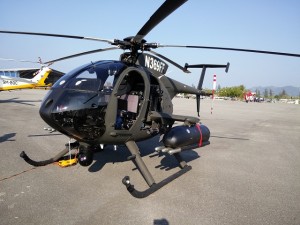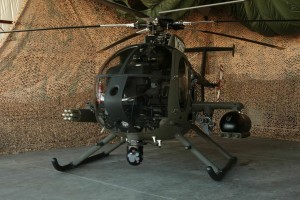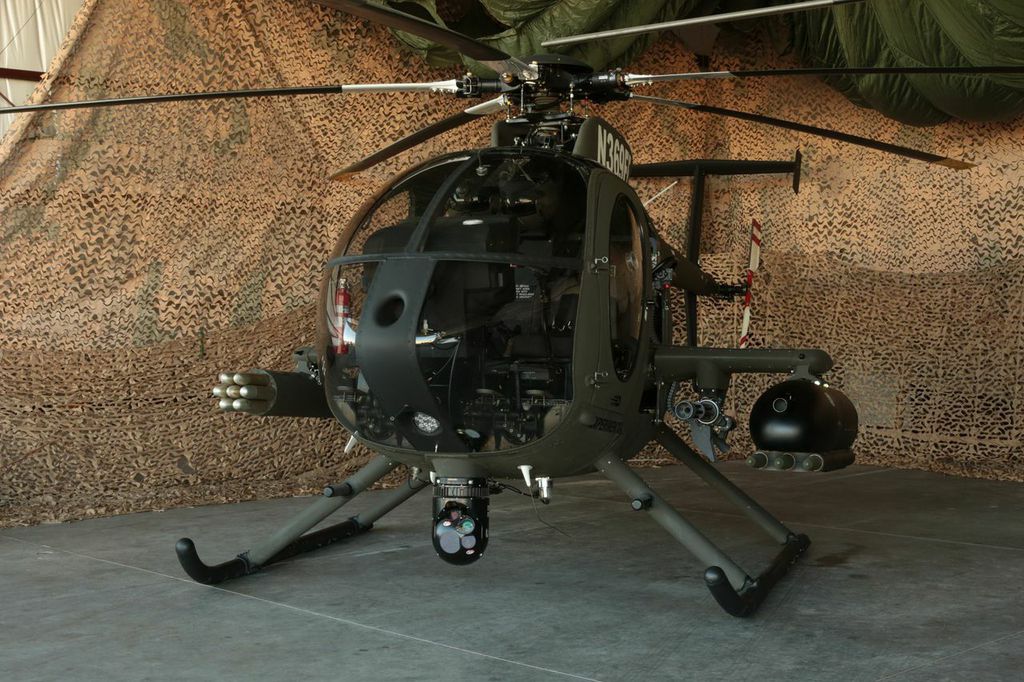SHAH ALAM: MD Helicopters, the manufacturer of the MD530G light scout attack helicopters has confirmed that Malaysia is buying six examples of the aircraft. Malaysian Defence had reported that the deal for the helicopters was signed in November. The deal was confirmed early this year.
The full release from MD Helicopters.
MD HELICOPTERS TO SUPPLY NEW MD 530G SCOUT ATTACK HELICOPTERS TO MALAYSIA’S MINISTRY OF DEFENCE
Malaysian Army Aviation to be launch customer for MDHI’s next generation light scout attack helicopter
MD Helicopters, Inc. (MDHI) is pleased to announce that it succeeded in its bid to supply six (6) MD 530G Scout Attack Helicopters to Malaysia’s Ministry of Defense. MDHI will deliver the launch helicopters to the Malaysian Army Aviation (Pasukan Udara Tentera Darat -PUTD) beginning in the fourth quarter of 2016, with the full fleet to deliver by the end of Q1 2017.

With this installation, MD Helicopters becomes the only rotorcraft original equipment manufacturer (OEM) to introduce and field two new Scout Attack Helicopter Programs, each within 12-months from award.
“Our legacy is firmly rooted in service of the warfighter; delivering fast, agile, highly-capable scout attack helicopters for the protection of the United States and our partner nations,” said Lynn Tilton, Chief Executive Officer for MD Helicopters. “
Perfectly suited for Malaysia’s operational environment, we are honored that the MD 530G – our next generation light scout attack helicopter – was selected by the Malaysian Prime Minister, Minister of Defence and the Chief of Defence Force (CDF) to be the newest addition to the Malaysian Armed Forces.”
MD 530G Development
As the latest in a lineage that spans more than 50 years of industry – leading scout attack helicopter evolution the MD 530G light scout attack helicopter made its debut flight in 2013.
With a top speed in excess of 130kts, the MD 530G is designed for agile deployment with any rotary wing unit. The aircraft features increased capacity landing gear to support the 3,750 MGTOW (max gross takeoff weight); allowing increased useful load for additional range, endurance, and weapons.

Successful live -fire testing of the MD 530G took place in mid- 2014. The result of considerable internal investment and strategic Industry partnerships, the aircraft – configured to include advanced avionics, an integrated on-board stores management system, forward looking infrared sensor, guided and unguided rockets, and inboard .50 caliber machine guns – demonstrated extreme firepower and bold performance capabilities, reinforcing the versatility, reliability and combat utility of MD Helicopters’ scout attack helicopter offering.
The Malaysian Army’s fleet of MD 530G helicopters will include a custom weapons package, advanced communications capabilities, and state of the art EO/IR to detect, identify, and engage a wide range of threats.
Capability and Sustainability
In addition to delivering the enhanced aerial fires capability and mission flexibility required by the Malaysian Army, MD Helicopters is committed to advancing indigenous capabilities regarding long term service, support and effective operation of the fleet.
MDHI will work with Bumiputra partners in all phases of the program, from defining requirements to a comprehensive CLS package that includes initial entry, transition, and combat pilot training, maintenance training for both the airframe and mission equipment, and the development of a spare parts program with dedicated and ongoing OEM support.
It is anticipated that the MD 530G will be deployed to perform attack, ISR, and security missions in support of the Malaysian Army’s operations in the Eastern Sabah Security Command (ESSCOM).
“We are extremely proud that our innovative aircraft will play an integral role in the PUTD’s mission to be a critical force multiplier for the Malaysian Army ,” Tilton concludes.
“We are confident our record of early delivery will continue with this contract and will allow the Malaysian Army to achieve significant operational successes in early 2017.
— Malaysian Defence
If you like this post, buy me an espresso. Paypal Payment
View Comments (14)
One great news for the earlier part of 2016. Btw, how many types of rotary wings aircraft are stationed in ESSCOM including the little bird?
Reply
At the moment, two,the Nuri and AW109. The EC725 will be there on on ad-hoc basis.
Small yet deadly with modest firepower
Perfect choice for PUTD (for the time being) indeed
I wonder what kind of armour/balistic protection does it have? Takut kena tembak dgn bakakuk pun out of action...
Reply
No armour AFAIK, probably fitted with self sealing fuel tanks only.
Takut kena tembak dgn bakakuk pun out of action… by Zul
Actually this can happen. Bakakuk can bring it down.
Maybe we can shoot down a helo with a catapult and a 'guli' or a glass pebble if it is hovering in a single location.The pilot must be hit in the face.
In the past, an AH-64A Apache can be brought down with a shot at the pilot with an AK-47 in 1990.
Yes, anything can be shot down and the Apache raid on Karbala turned into a disaster but the fact remains that of the thousands of flown from the time the invasion begun till the time the regime changers reached Baghdad; barely a handful of Apaches were shot down...
Given the size of the Little Bird, plus the weight from the fuel, crew, passengers and ordnance; does anyone realistically expect it to be fitted with ballistic protection?
What the hell is a Bakakuk??
Marhalim,
Are 6 of these glorified, armed lawnmowers enough? (just kidding about the lawnmower!). Where exactly will they be placed? Lahad Datu?
Also, I have done some research about submarine batteries, if you will allow me..
The Royal Australian Navy used to change their submarine lead batteries every 3 to 5 years, so the timing of the Scorpene refit now is not surprising.
However, the strange aspect is that each refit will take 18 months, which sound excessive. So, may I speculate that the RMN is actually changing the type of batteries as well.
Lithium ion batteries are the way to go now, and it can be done by installing the batteries and changing some of the wiring and adding a fire suppressant system. It is much cheaper and easier than a full AIP system. Apparently AIPs will allow the sub to stay much longer underwater, but the power is quite feeble. Lithium will allow the sub to stay underwater perhaps a week, but with enough power to sustain high speeds underwater. Also, with lithium, there is no need to cut the hull to insert the 200ton plug.
So, that's what I suspect. Feel free to disagree.
Reply
Bakakuk is home made shotguns, quite numerous in Sabah. The MD530G will be based at Semporna where the helicopter base is located. They were talking about 12 originally, later down to eight and finally signed for six. So I guess its not enough.
The only thing that cant never be brought down is a heli stored in it hangar. The only heli that can withstand flak cannon is the mi-24/35 family. The killer egg utilizes speed and agility in it mission and it is not full fledged attack heli. It function more toward armed scout, low intensity COIN, special forces fire support.
As for the scorpene refit,
The problem at first place, why on earth we ask them to sail from Toulouse to Sepanggar by their own power ? Wasting their mileage on waste journey. No idea who decision is it the PTL or PAT/ Mindef. But who cares, Malaysia Boleh!
Reply
By sailing home in the submarines the crew validated their training and more importantly to look out for faults. Prior to that they were only confined to the waters in the Mediterranean and parts of the Atlantic. The journey home through the Indian Ocean gave them, the crew, though not in an operational scenario a wonderful insight of what a submariner will face. Therefore it was not wasteful. In their case it was the journey not the destination.
Tat a good question Gonggok. Sg like to play hard with name and tonnage. And most often use baseline tonnage before frill is added. As for name..Endurance is a LST. And Sg first LHD or light carrier is JMMS for humanitarian and I think final class will be LPD or LST.
If you look at the Victory it used to be cleaner when 1st build and now pack with so many stuff and taller mast. It confirm heavier now.
Yes the whole idea of having an AIP is so the sub doesn't have to snorkel. It also makes for a quieter boat. When running on batteries the CO will always do things to conserve power, including switching parts of the AC off, as well as displays. His main concern is to always have that extra battery power available in case he suddenly needs it.
The interesting thing is that the Japanese navy - compared to others - has been late getting into the AIP game. What's interesting about MESMA is that virtually any port or base in the world has the facilities for it; unlike the fuel cells used on the Type 214s.
John Rambo - ''The problem at first place, why on earth we ask them to sail from Toulouse to Sepanggar by their own power ? Wasting their mileage on waste journey. No idea who decision is it the PTL or PAT/ Mindef. But who cares, Malaysia Boleh!''
Think before hitting the keyboard......
If we had decklifted both boats home, the crew would have got no needed experience. Bringing the boats back provided the crews with real life, day to day, valuable experience that training can't provide .... And as Marhalim pointed out : it validates faults/defects while both boats were still under warranty......... BTW, the bulk of subs ordered worldwide by foreign customers are brought back home by their crews; not decklifted.